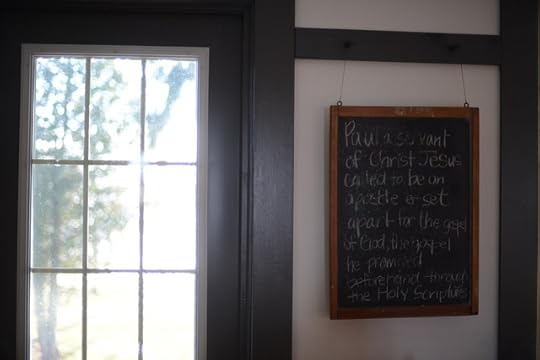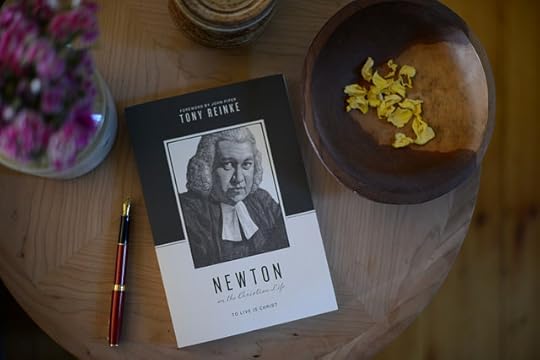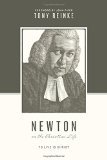when you want to walk through the hardest part of following Jesus
Sometimes you unexpectedly meet a person & you find yourself face to face with what it means to be more like Jesus. The way Tony Reinke has thoughtfully listened and engaged ideas with me, the way we have learned from each other, sharpened each other, challenged and encouraged, edified and prayed for each other, has been a model to me of what it means to be brothers and sisters growing in Christ. He has been a prayer warrior for us — and he’s been the kindest, Christ-like friend in ways our family will never, ever forget. You may know Tony’s voice as the host of the Ask Pastor John podcast, but he is also an author and his new book on the pastoral care of John Newton in a book titled Newton on the Christian Life: To Live Is Christ. As I turned these relevant, refreshing pages on Newton, I felt so many times like my heart might burst for the joy of it. So we’ve invited Tony, a brother I hold in the highest esteem, to share more with us some of the soul-stabilizing wisdom from one of the most interesting and relevant pastors you will ever meet, John Newton. It’s a grace to welcome our brilliant friend, Tony Reinke, to the farm’s front porch…
Amazing grace! how sweet the sound,
that saved a wretch like me!
I once was lost but now am found,
was blind but now I see.
So the President closed his recent eulogy in Charleston by leading the congregation in an impromptu singing of Amazing Grace, the most famous hymn in the English language.
And the whole country — much of the world — joined in.
The song is so familiar many of us can sing these lines by heart.
But long before Amazing Grace was sung in a Charleston church, or recorded countless times in Nashville recording studios, or hummed over a kitchen sink, these old lyrics told the story of its author, John Newton.
A Wretch Bottoms Out
Newton was an eighteenth century wretch, and he knew it.
His early life in England was full of rebellion and selfish sin. His tongue was loaded with venom, and his heart dripped with bitterness.
When he wasn’t leading his friends in foolishness, he was making enemies with anyone in authority over him.
Newton’s Christian mother died when he was seven, and for most of his life he was raised by a religiously detached and emotionally distant father.
Yet Newton was always haunted by God.







As a young man, he fled, like Jonah, away from God and into a sea merchant’s life, where his sin could run free and unfettered.
His disdain for God kept him on water and away from churches, and his love of money lured him into the African slave trade.
But Newton’s ambition for a life “free from God” came to an abrupt end one night, when a violent North Atlantic storm slammed into his ship, and the Commander of the waves crashed into John Newton’s 22-year-old debauched life.
Death brushed close to Newton that night, so close the huge waves almost swept him off the deck and nearly swallowed his ship.
The brink of death can break thick iron chains of obstinate pride, and it did for Newton.
He would never forget this moment for the rest of his life.
God spared his life (and his ship), buoyed his soul, and shook him from his spiritual sleep and ignited new desires in his life that would culminate in his full conversion.
By amazing grace, Newton became a devout Christian.
By amazing grace, he became a devoted husband in a beautiful love story for the ages.
By amazing grace, he became one of the greatest hymn writers in history, an influential abolitionist, and a skilled pastor of souls.
By amazing grace, John Newton used the backdrop of his sin to display the magnificence of Christ.
To Social Media
Newton had a story to tell the world.
Within just a few months of becoming a pastor at age 39, Newton published his conversion story in a short autobiography.
His popularity exploded overnight. He became a celebrity convert, a center of attention, and the recipient of many letters.
Newton embraced the social media of his day — letter writing — and faithfully served in this role for nearly 50 years. Today many consider him to be the greatest writer of pastoral letters in the history of the Church.
In the nearly 1,000 letters we can now read for ourselves, Newton wrote to skeptics who were unconvinced of their need for Christ, to perplexed Christians who were mystified by life, and to many of his friends who were stumbling through the darkness of depression.
Newton used his experience, and his pen, to be a voice for Christ.
Those precious letters have been a steady diet for my soul over the years. Newton has become a friend who corrects me, encourages me, and challenges many of my assumptions about the ideal Christian life.
Life at Its Hardest
In one letter, Newton looks back over his life and writes to a friend: “If I may speak my own experience, I find that to keep my eye simply upon Christ, as my peace, and my life, is by far the hardest part of my calling.”
Wait, what?!
How can a man with one of history’s best-selling conversion stories wake up and forget Christ? And yet he did.
“To live is Christ” (Philippians 1:20).
He forgot it often. So do I.



I have a propensity to live with no awareness of my dependence on Christ.
Like Newton, I need this reminder every day.
Christ is not my acquaintance when I need a quick ‘hello’; He is my deepest and truest Friend.
Christ is not my battery pack when I need a quick jolt; Christ is the power plant of my spiritual life. I am united to Him, and He generates my wisdom, my righteousness, my sanctification, and my redemption. He is the boast of my life (1 Corinthians 1:30–31).
Newton will not let me forget Jesus.
Newton reminds me that I live by the life of Jesus.
I live by Christ, who healed bodies with a touch and who commanded death to flee with a word.
I live by Christ, who commanded waves to stop crashing and who commands sinners to stop sinning.
Most soberly of all, Newton reminds me that I live by the death of Christ, who was hammered to a cross in my place, and who drank down all the bitter dregs of God’s wrath for all my hell-deserving acts of rebellion against my Creator.
This Christ. How can I forget that I live by this Christ, who bled blood so red that it bleached my soul white?
How can I forget this Christ who rose from the dead in a victorious power that defeats every one of my sins?
How can I forget this Christ who ascended into the sky, and now reigns over every power and principality he defeated?
And still I manage to ignore him.
The Source of Our Daily Joy
The truth is, I live in a loud and busy world.
Keeping Christ in view is a fight, the central fight of my Christian life, and the central fight for my daily joy.
This daily struggle to keep my eyes focused on Christ is not how I save myself.
My daily focus on Christ is — as it was for Newton — a reminder that my full salvation is found in Jesus. He “is able to save to the uttermost those who draw near to God through him, since He always lives to make intercession for them” (Hebrews 7:25).
To the uttermost.
This was a precious word John Newton delighted in and studied carefully, like a diamond in his hand.
“It has an extensive meaning,” he wrote in a letter. “It includes a conquest over all difficulties, and a supply of all that is necessary. How totally, and (if possible) how often, should I have been lost, had not Jesus engaged to save to the uttermost.”
My hope is not in my ability to remember, but in Christ’s power to save.
In his letters, Newton pours image after image to make his point. Christ enlightens the most ignorant, He softens the hardest heart, He rescues the most lost, He delivers the most tempted, He comforts the most distressed, and he pardons the most guilty.
In defiance of all my sins, and my fears, and my forgetfulness, Christ saves to the uttermost.
My Life
The brilliance of Newton is seen in the ease of translating his 18th-century letters into my 21st-century life. Like Newton, I forget Christ in my life because I center my life around me.
Yet there is hope for me in Newton’s social wisdom.
Pre-Instagram Newton reminds me that Christ can save me from a soul-emptying addiction to praise and applause. Christ is more satisfying to my soul than likes and shares.
Pre-Facebook Newton reminds me that Christ is sufficient to save me from an addiction to online, click-bait controversies, curiosities, and celebrity news.
Christ alone satisfies the awe-hunger in my heart.
Newton’s words point me, over and over again, to the Savior who saves to the uttermost.
So, yes, Newton is right. The hardest part of the Christian life is keeping the eyes of our souls focused on the beauty of our Savior.
We must fight for focus in our daily lives — in worship, in prayer, in Bible-reading, and in between smartphone notifications.
Newton knew why this was all so important. Catching frequent sights of the glory of Jesus Christ is the apex of my spiritual freedom, it is the fuel for my daily joy, it is the key to all my personal growth and maturity, and it is the pathway to glory (2 Corinthians 3:16–18).
John Newton reminds me that keeping my focus on Christ is the hardest part of my life.
But Christ is worth the fight.
Christ is our life —
and His amazing grace is the sweet supply of our daily joy.
Tony Reinke is a writer for desiringGod.org and the host of their popular Ask Pastor John podcast. Tony is the author of two books, one on reading — Lit! A Christian Guide to Reading Books — and a new book on the most important life lessons he gleaned from reading the letters of John Newton — Newton on the Christian Life: To Live Is Christ (2015).
The beauty of Christ shines on every page and my prayer is that many readers will linger long in these pages and to find their hearts satisfied in Christ.
Life Changing, soul refreshing Summer Read: Highly recommending Newton on the Christian Life: To Live Is Christ.

Ann Voskamp's Blog
- Ann Voskamp's profile
- 1369 followers











